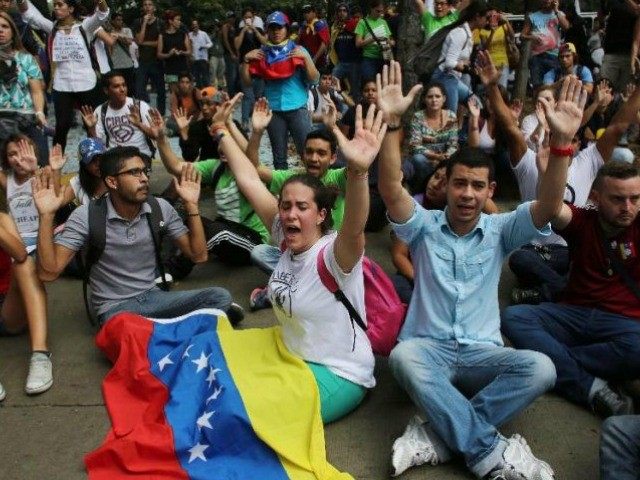The Bolivarian National Guard of Venezuela attacked a group of student protestors with tear gas in San Cristóbal, Táchira, a western regional capital that has become the center of revolt against that nation’s socialist government.
Venezuelan newspaper El Universal reports that students had organized in San Cristóbal, well-known as a college town, to deliver to the regional government building a document in protest of numerous objections to the way President Nicolás Maduro has run the country in the last two years, including both the political oppression of dissidents and fixed price controls and a ration policy that has made it near impossible to buy goods as common elsewhere in the West as flour and laundry detergent.
The group chose February 12 for their march to the municipal building as a way to commemorate the beginning of a national wave of protests last year, which culminated in the arrest of organizer and opposition leader Leopoldo López on February 18. López, who was initially arrested on “terrorism” charges, remains in prison awaiting a trial.
Upon arriving to the municipal building to deliver their document with demands, student protest organizers said they were met with a wall of riot-proof National Guard police. None of the students known to have organized with the group moved, fearing a confrontation. Witnesses tell El Universal that they instead saw unidentified hooded figures join the crowd and begin to throw rocks at the National Guard. In response, the National Guard attacked the group, using tear gas to dissolve the assembly.
Reinaldo Manrique, one of the event’s organizers, told the newspaper that he suspected the hooded figures to be infiltrados (“infiltrates,” or government agents paid to cause disturbances among protest groups) and that none of the assembled students recognized them from any of the universities in the city. “Some infiltrados came out in hoods and threw rocks to create chaos,” he stated. “It got out of control, and we hold those hooded ones responsible who were sent to sabotage and damage the march that had the objective of delivering the document.”
Many attending the march captured images of chaos and violence in the aftermath of the tear gas attack.
“Senior citizen injured by NAZIonal guard in peaceful protest @indignadosvene2: San Cristobal #12F pic.twitter.com/OI6h4gATqH“”
— suzan machado (@smachado81) February 12, 2015
This is #Tachira #SanCristobal #YoSalgoPor pic.twitter.com/I9JCKSrZ4r
— Myteks Media Labs (@myteks) February 12, 2015
#12F This is happening right now in Táchira, Venezuela. Students have been protesting peacefully. The regime attacks. pic.twitter.com/xpNubO6GeH — Eurybia Harpalyke (@EurybiaH) February 12, 2015
#12F #Venezuela rallies continue as peaceful protesters clash with military police @Telemundo51 pic.twitter.com/cjWrOKrT7Q — JRodriguez (@JRodzMIA) February 12, 2015
#12F: .@Kasparov63 The Bolivarian Pseudorevolution is celebrating Venezuelan Youth Day with brutal repression again. pic.twitter.com/G5XRthndXS
— RalphGM (@RalphGMWorks) February 12, 2015
TR @MovimientoUCV #12F Venezuela doesn’t forget its heroes. Student movement again the streets #UCV @ReporteYa. pic.twitter.com/ulzU0NyW6t
— John Suarez (@johnjsuarez) February 12, 2015
Argentine news outlet Infobae recalls that, on February 12, 2014, students organized the first mass national protest against the government, citing both economic and political reasons to call for government reform. The violence escalated to such an extent last year that many prominent Chavistas, including Táchira governor José Gregorio Vielma Mora, made public statements denouncing the national government. “I am against treating a protest with violence. Here no one is authorized to exert force… I am not a part of the regime; I was elected by the citizens of Táchira,” he said at the time, before almost immediately retracting his public statements on Twitter.
Vielma Mora has since kept almost entirely in line with the government, particularly after the arrest of Daniel Ceballos, the mayor of San Cristóbal, last year (Ceballos remains behind bars). In response to the violence yesterday, Vielma Mora has taken to accusing mysterious out-of-state sources of agitating students. “We are very sure that one of the mayors in Miranda state [outside of Caracas], with plenty of money, is sending economic resources to Táchira state to keep the protests going,” he alleged. Miranda state’s governor, Henrique Capriles Radonski, unsuccessfully ran against Maduro in the 2013 presidential election.
Venezuelans staged protests across the country yesterday– particularly also in the capital, Caracas, and its outskirts. None appeared to have gotten as violent as those in San Cristóbal, however: the town that beheaded its statue of Hugo Chávez early last year. Protests are expected to escalate next week, as well, when protesters observe the anniversary of Leopoldo López’s arrest.

COMMENTS
Please let us know if you're having issues with commenting.